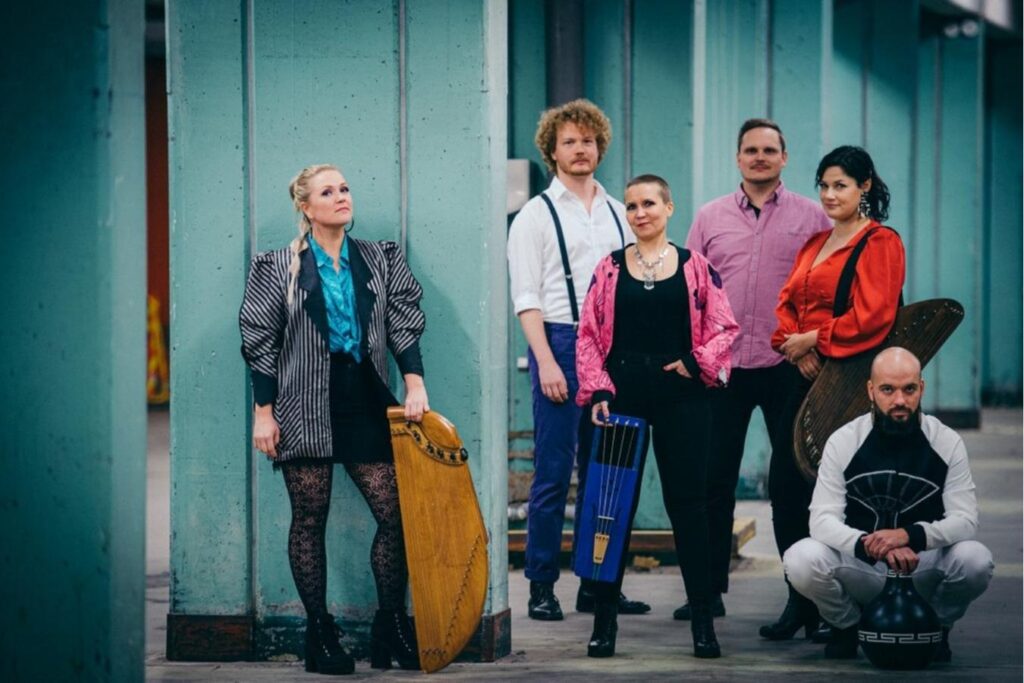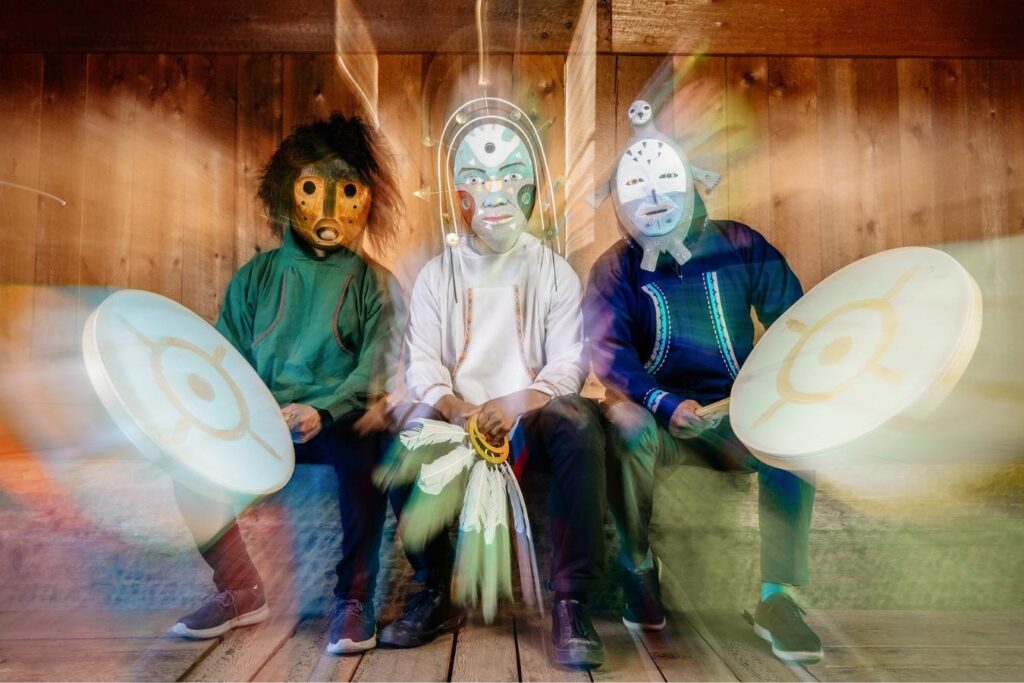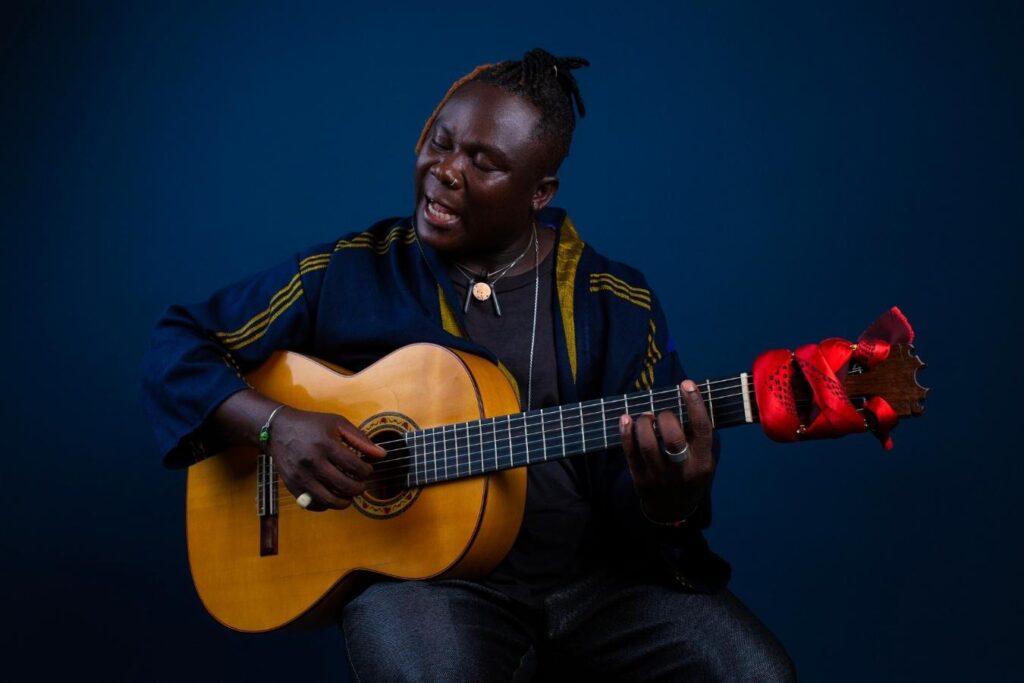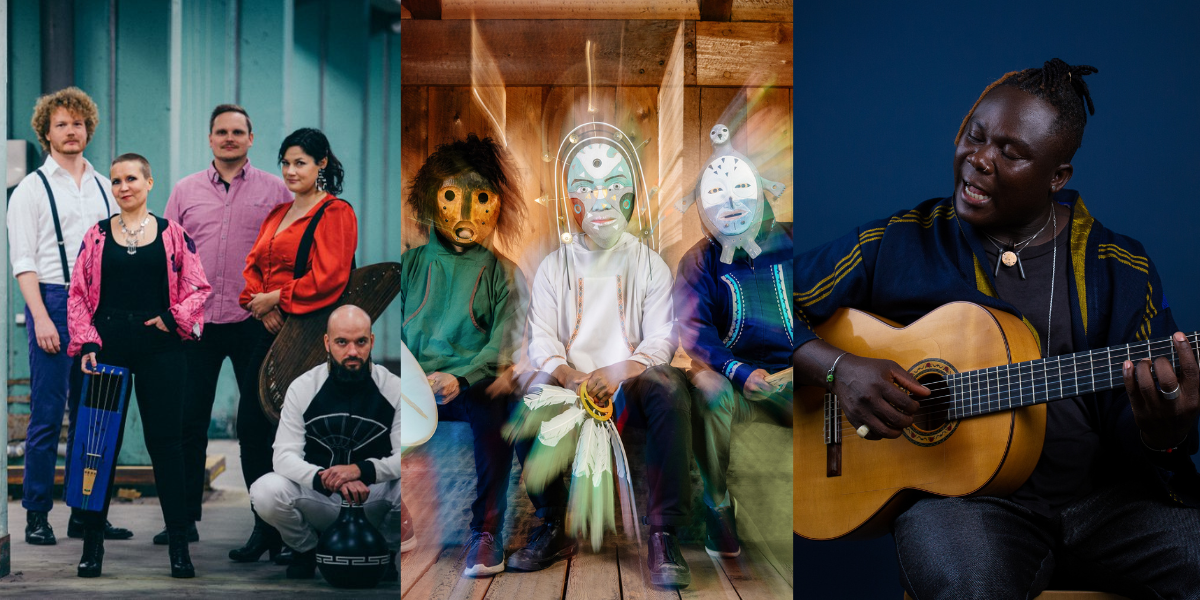We’re thrilled to welcome three incredible ensembles to the Midwest as part of World Fest this year. Take a look below to learn more, and then see them in person in a community near you!
Okra Playground
Okra Playground plays traditional Finnish music with a fresh approach, combining classic folk with modern instruments to create unique tunes with hypnotic beats and a homegrown feel. While rooted in the traditions of their homeland’s music, the project also serves as a musical “playground” for its members to experiment with new instruments and techniques, just as the group’s name suggests!
Learn more about Okra Playground
Pamyua
Pamyua is Alaska’s most famous Inuit band. Founded in 1995 by brothers Phillip and Stephen Blanchett, the group includes Ossie Kairaiuak and frequent guest member Karina Moeller. Their performances honor and share indigenous Inuit cultural traditions through ceremony and songs passed down through generations. Their unique performances blend traditional Inuit drum/dance melodies with contemporary R&B and soul music, often referred to as “tribal funk” or “Inuit soul.”
Learn more about Pamyua
Okaidja Afroso
Okaidja Afroso follows his family’s tradition of storytelling by creating genre-defying music that calls back to his upbringing in a village on the western coast of Ghana. His music speaks to a spectrum of experiences deeply connected to the traditions of the African diaspora. He is devoted to bringing together diverse modes of expression in pursuit of global harmony through his signature performances that blend percussion and dance.
Learn more about Okaidja Afroso
Meet the Ensembles
Learn more about our current World Fest ensembles, through interviews with the groups themselves.
Ahead of their upcoming tours, Okra Playground answered some questions about their hopes for their upcoming residencies—read more below, and check out their artist videos.
How do you describe the music you make to someone who has never heard Finnish folk music?
We combine traditional Finnish folk with modern soundscapes and old texts to our own lyrics. Our songs have roots deep in the Finnish soil, but their tallest branches spread out towards the furthest shores of world music.
What’s one question you’ve always wanted to be asked about your music?
Q: Why do you make music?
A: Making music brings us joy but the great thing is that it gives us the chance to lift up others as well.
What do you hope World Fest communities learn from you?
We hope to introduce people to different approaches for expressing their creativity, finding ways for open-mindedly crossing boundaries and existing as a part of the long chain of tradition in their own way.
What do you hope to learn from the World Fest communities?
Local cultures and ways of life — maybe a couple of new songs, too. And some nice new dessert recipes!
What are you most excited for on this tour?
Seeing a new part of the world, getting to know a lot of new people and playing our music for new audiences. We are also excited to perhaps learn something new about ourselves through the people and cultures we’ll get introduced to. Also, for the tour, we have rehearsed new songs from our third album which comes out this fall. We’re really looking forward to the trip!
Ahead of their upcoming tours, Pamyua answered some questions about their hopes for their upcoming residencies—read more below, and check out their artist videos.
How do you describe your music to someone who has never heard Yup’ik music?
Our music is inspired by our identity. A lot of our Inuit music has many of the same qualities akin to the rhythm and execution of modern soul music, R&B, funk, soul, and jazz. Our music is alive—it is connected to the spirit and the soul.
What kind of imagery do you visualize most when you perform your music?
Usually we visualize gatherings back home where dancing and singing is done in a ceremonial way. This involves the whole community. Multigenerational diverse mix of the community celebrating together. It’s a powerful image.
What do you hope World Fest communities learn from you?
We are rooted in the songs of our heritage. We hope that through our performances of Yup’ik ceremony, dances and music, that we create a positive awareness and deeper understanding of the human experience. We want to create a better understanding of the relationship humans have to the environment and to our animals and how beautiful it is to prioritize that relationship through our social interactions. We place a big priority on honoring this special relationship through our lifestyle and want to communicate that through our music. Ceremonies are a big part of our Inuit culture—along with dancing, feasting, and lots of social events.
“We hope people find a deeper appreciation of each other and learn to honor something outside of themselves, by honoring and respecting the mystery of the human experience and each other. We want our audiences to have a sense of how indigenous people honor their ancestors, their heritage, their traditions and to express how that relationship inspires our intentions and is mirrored in our lifestyle. We hope it encourages people to appreciate each other,” said co-founder Phillip Blanchett.
What do you hope to learn from the World Fest communities?
How we are all influenced by cultures globally…. We hope to be inspired by the different cultures each community has to offer and share their energy and influence in our music with audiences everywhere.
What are you most excited for on this tour?
We’re excited to learn about the Indigenous people on the land that we’re visiting. We are also excited to meet the diversity in each community.
Ahead of his upcoming tours, Okaidja answered some questions about his hopes for his upcoming residencies—read more below, and check out his artist videos.
How do you describe the music you make to someone who has never heard Ghanaian music?
Ghana is known for the Highlife music style, which incorporates polyrhythmic styles from various parts of West Africa, with Jazz and Blues. My work, however, is a mixture of Ghanaian traditional music and dance, with influences from the African diaspora.
What’s one question you’ve always wanted to be asked about your music?
How do you get the inspiration to write your music and create the onstage performances, as well as educational outreach to engage the communities you visit?
What do you hope World Fest communities learn from you?
I hope the World Fest communities are able to learn about Ghanaian music and culture.
What do you hope to learn from the World Fest communities?
In my 23 years in America, I feel like I still have a long way to go in terms of learning about the unique cultures of different parts of the country. I hope to learn more about the Midwest through the World Fest communities.
What are you most excited for on this tour?
I am very excited for the opportunity to share my culture with the World Fest community.
A program of Arts Midwest, the 2022 World Fest artist tours are generously supported by the National Endowment for the Arts and Margaret A. Cargill Philanthropies. Arts Midwest is also generously supported by the Illinois Arts Council Agency, Indiana Arts Commission, Iowa Arts Council, Michigan Arts and Culture Council, Minnesota State Arts Board, North Dakota Council on the Arts, Ohio Arts Council, South Dakota Arts Council, Wisconsin Arts Board, 3M, Crane Group, and individual donors and partners.
